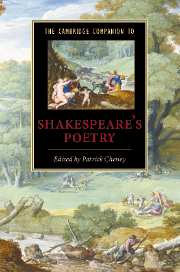Book contents
- Frontmatter
- Introduction: Shakespeare’s poetry in the twenty-first century
- 1 Shakespeare and the development of English poetry
- 2 Rhetoric, style, and poetic form
- 3 Print and manuscript
- 4 Venus and Adonis
- 5 The Rape of Lucrece
- 6 The Passionate Pilgrim and ‘The Phoenix and Turtle’
- 7 The Sonnets
- 8 A Lover’s Complaint
- 9 Poetry, politics, and religion
- 10 Love, beauty, and sexuality
- 11 Shakespeare and classicism
- 12 Poetry in Shakespeare’s plays
- 13 Poetry and performance
- 14 Reception and influence
- Reference works on Shakespeare’s poetry
- Index
5 - The Rape of Lucrece
Published online by Cambridge University Press: 28 May 2007
- Frontmatter
- Introduction: Shakespeare’s poetry in the twenty-first century
- 1 Shakespeare and the development of English poetry
- 2 Rhetoric, style, and poetic form
- 3 Print and manuscript
- 4 Venus and Adonis
- 5 The Rape of Lucrece
- 6 The Passionate Pilgrim and ‘The Phoenix and Turtle’
- 7 The Sonnets
- 8 A Lover’s Complaint
- 9 Poetry, politics, and religion
- 10 Love, beauty, and sexuality
- 11 Shakespeare and classicism
- 12 Poetry in Shakespeare’s plays
- 13 Poetry and performance
- 14 Reception and influence
- Reference works on Shakespeare’s poetry
- Index
Summary
Shakespeare's second narrative poem, printed in 1594, links non-consensual sex with a tyrannical regime: Tarquin's violation of his friend's wife not only damages her but also shows him unfit to govern the state. Lucrece is almost certainly the 'graver labour' promised in the dedication to Venus and Adonis, and its mode of address is appropriately elegiac, as well as rhetorically complex, characterized by intricate wordplay and elaborate conceits. These features, admired then, less appealing now, have often deterred modern readers. Is there, even so, a ready way through a text that has proved puzzling or alienating in our own time?
Tarquin's rape of Lucrece also goes on to haunt the margins of Shakespeare's plays. As a point of reference for later works, the story is repeatedly invoked at moments of dramatic tension, with the effect of bringing out the significance of the action. In Shakespeare's own epoch Lucrece's tragic tale and its political implications were already widely current, and the legendary names alone would have alerted a substantial proportion of the audience to specific resemblances. In addition, the exceptional popularity of Shakespeare's poem itself must have reinforced the familiarity of its subject matter. If the chaste Lucrece had come to stand as a byword for marital fidelity, Tarquin's name evoked the violent abuse of power. Their story carried a variety of resonances in the early modern period, so that by citing the events he had already recounted in one genre, Shakespeare could extend in another the range of meanings available to his audience.
- Type
- Chapter
- Information
- The Cambridge Companion to Shakespeare's Poetry , pp. 90 - 107Publisher: Cambridge University PressPrint publication year: 2007
- 3
- Cited by

